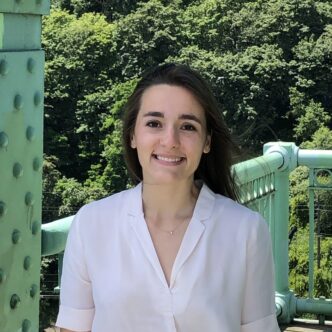Madeleine Landry

Dual Anti-CD47 and Duramycin Functionalized Carriers for Radio-Enhanced Drug Delivery
Summary
The majority of patients diagnosed with cancer undergo chemotherapy, and usually for a prolonged period with multiple cycles. Chemotherapy is toxic to healthy cells as well as cancerous cells, and is injected in the bloodstream, leading to exposure to healthy cells. This results in unbearably painful side effects for patients. Because of the toxicity, many patients must end chemotherapy prematurely before finishing the cycles. However, many clinically approved nanoformulations have decreased the side effects of traditional chemotherapy and increased the dose that reaches the cancerous cells, allowing for lowered dose of drugs in some cases. Nanoformulations can act to shield the drug from healthy cells with triggered release in the cancerous cells, have targeting moieties that increase accumulation at the tumor, can increase the circulation time in the blood, or a combination of the above. We propose encapsulating the chemotherapy in a nanoparticle surface modified with targeting moieties to increase localization to the tumor by targeting radiated tumor tissue. Radiation therapy is often prescribed alongside chemotherapy and uses a highly focused beam. X-ray radiation leads to an increase in certain cell surface markers in the radiated cells, including lipid phosphatidylethanolamine and protein CD47, that we can take advantage of to specifically localize the nanoformulations encapsulating the chemotherapy to the tumor. Our approach has the potential to decrease off-target effects that afflict patients during systemically delivered chemotherapy, making multiple treatment cycles more tolerable for them.
Receiving a fellowship from the PhRMA Foundation has allowed me to continue pursuing my career goal of becoming a research scientist. Analytical techniques that strengthen my hypotheses are now accessible, and I will benefit from the PhRMA Foundation network professionally for years to come. The Foundation’s support has also been a great benefit, overall, to our relatively small PhD program.
